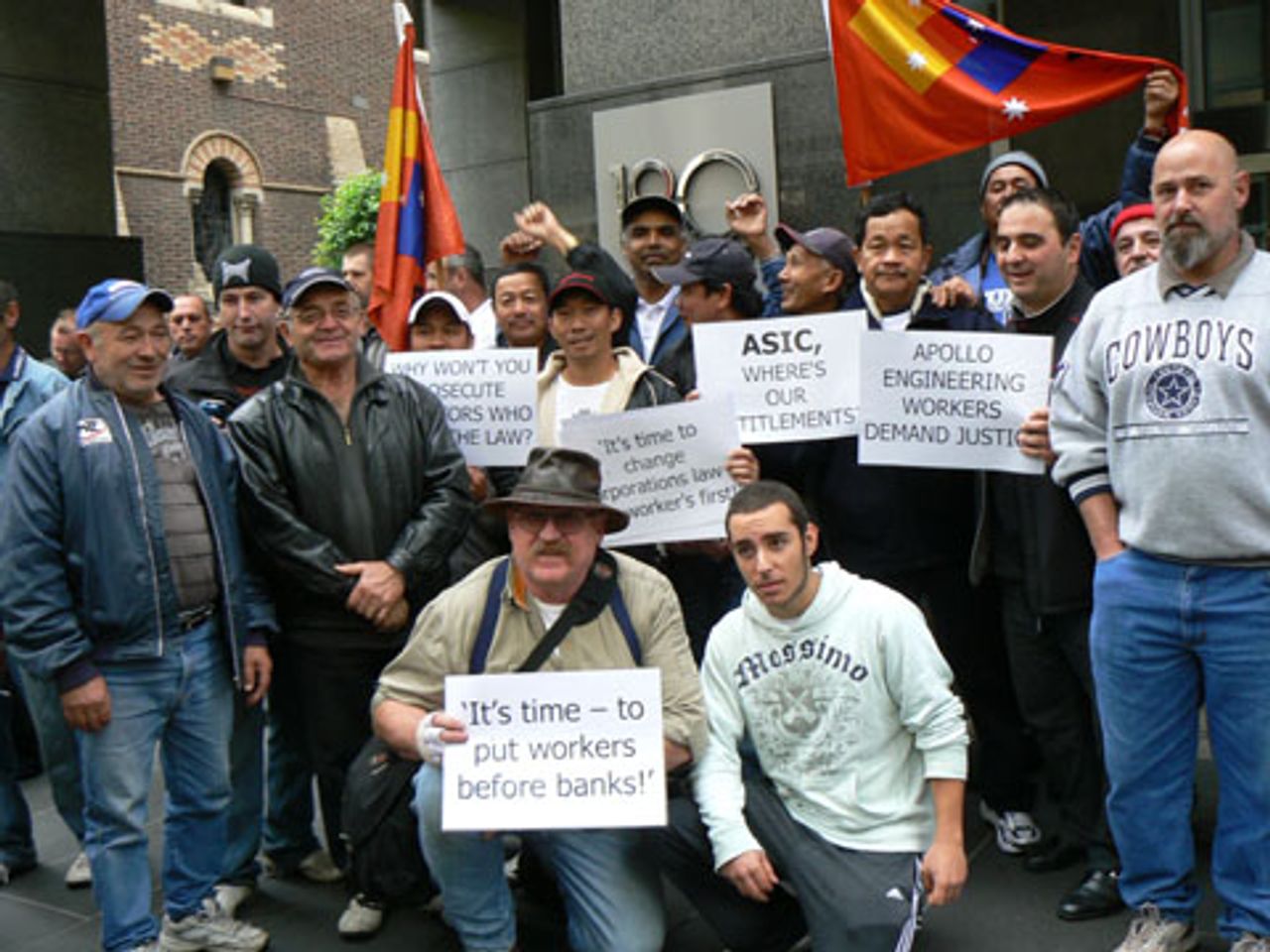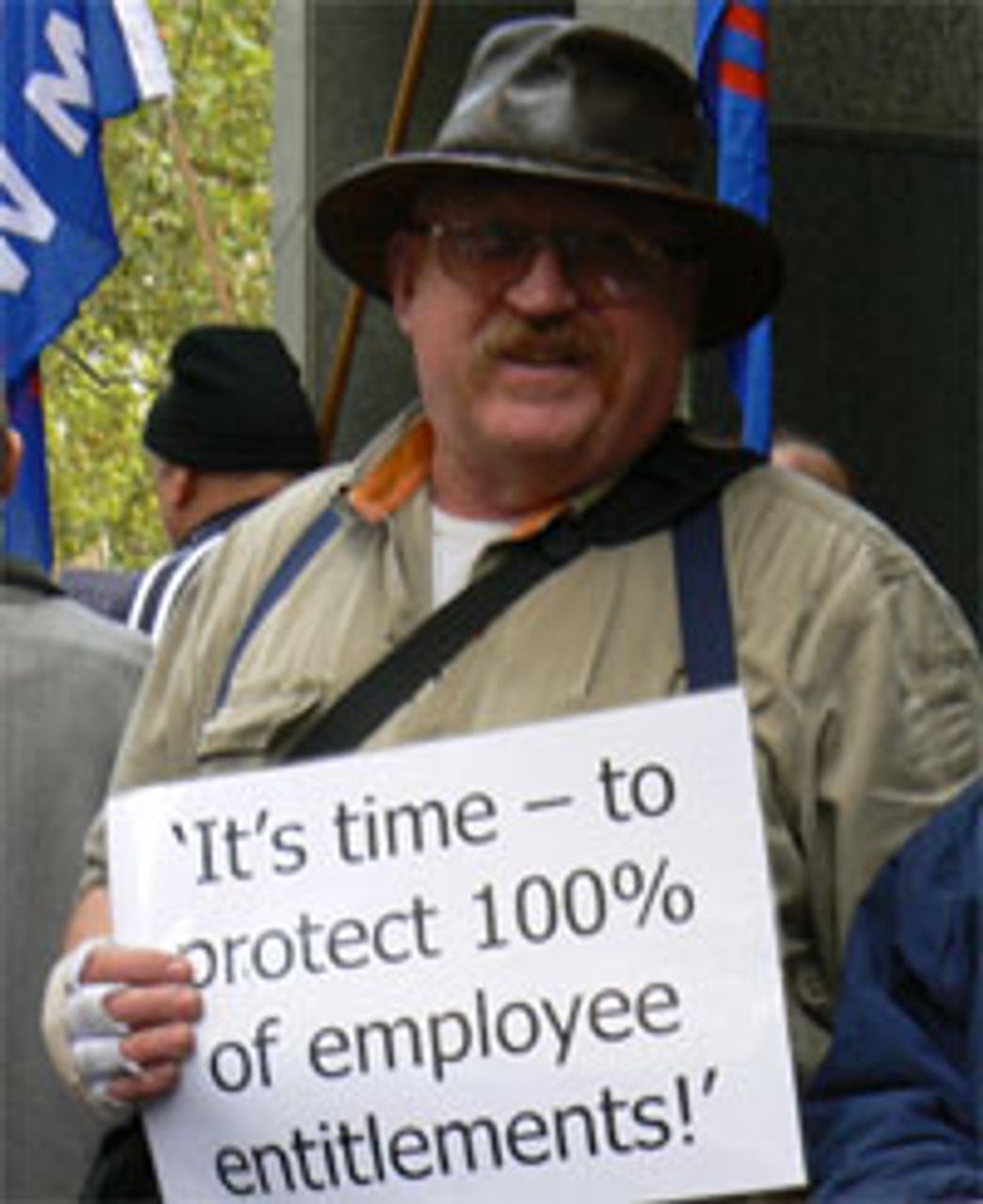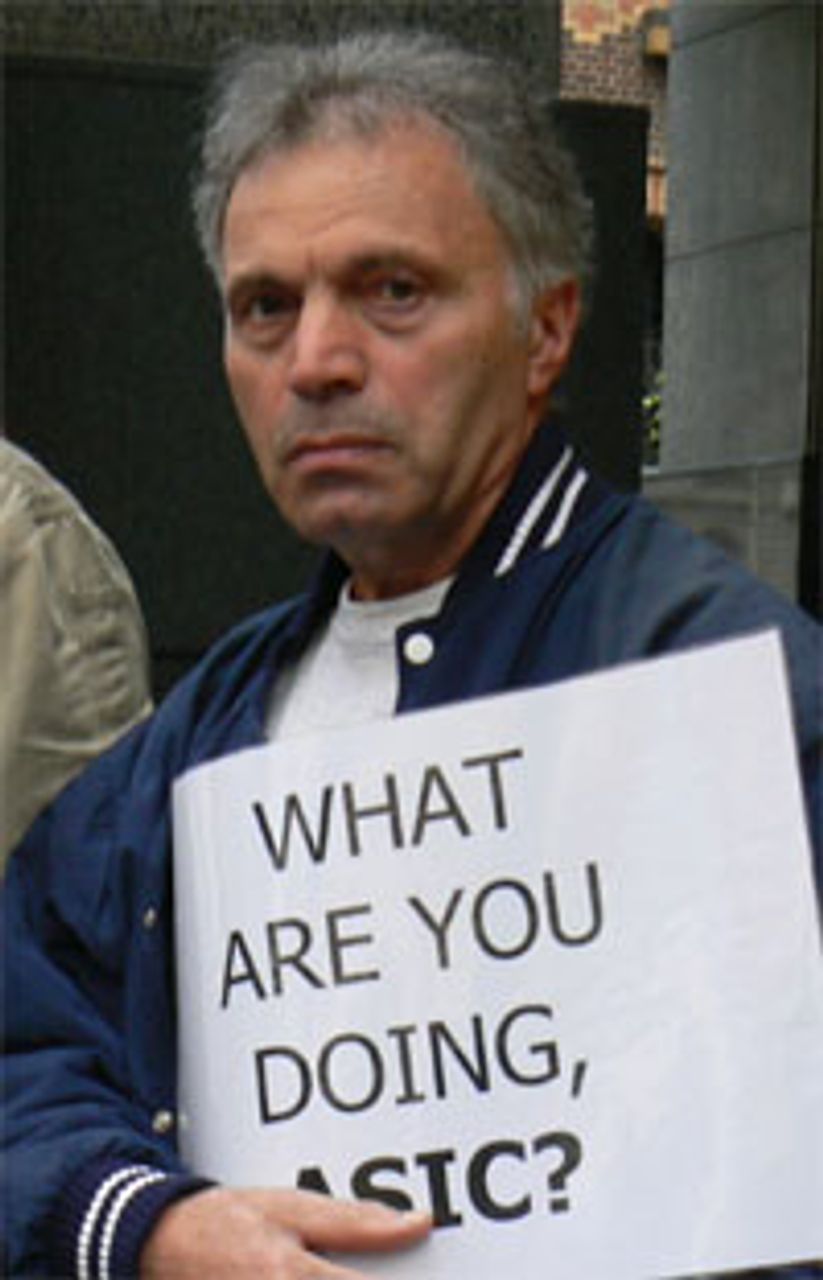Sacked metalworkers owed unpaid superannuation, leave, and other entitlements were among about 100 people demonstrating last Friday outside the Australian Securities and Investment Commission (ASIC) in Collins Street, the heart of the business sector of Melbourne. The largest contingents were workers from the Forgecast plant in eastern Melbourne, which initially shut down production last year, and Apollo Engineering. Other delegates reportedly attended from failed companies Paragon Printing, Metaltec, Coghlan and Russell, and Huon.
One hundred Apollo employees were stood down last week when the company suddenly went into receivership. They were formally sacked on Thursday, with most workers owed large amounts in wages and superannuation payments. The company’s receiver will try to find a buyer in the next three weeks. At both plants in Altona and Heidelberg the workers are mounting 24-hour pickets.
 Metal workers demonstration
Metal workers demonstrationThis situation is becoming increasingly commonplace amid an ongoing crisis in the Australian manufacturing sector. The corporate legal framework encourages struggling company owners to declare bankruptcy and transfer their capital assets to a renamed, “phoenix”, company, thereby evading responsibility for their workers’ accrued entitlements. The banks and other creditors are assigned priority when recovering the failed company’s debts, with employees coming last on the list.
Yesterday’s protest was called by the Australian Manufacturing Workers Union (AMWU) as part of its stated aim of pressuring the Labor government of Prime Minister Kevin Rudd to increase public compensation for unpaid redundancy entitlements, through the General Employee Entitlement and Redundancy Scheme (GEERS), and give workers priority claim ahead of the banks in the event of corporate collapses. The union also wants ASIC to recover assets and investigate corporate collapses for smaller companies.
AMWU state secretary Steve Dargavel told protestors that the union’s national secretary, Dave Oliver, was “going to speak to the government today to ask them to protect workers and to change corporate law to put workers first”. Officials from the National Union of Workers and Australian Workers Union (AWU) made a few demagogic remarks about corporate machinations against workers.
The trade unions are directly complicit in the ongoing assault on jobs, wages, and conditions in the manufacturing sector. Over the last three decades they have functioned as ruthless enforcers of the dictates of big business, overseeing the destruction of large sections of industry and sabotaging any move to defend jobs and conditions.
The AMWU’s so-called campaign in defence of recently sacked workers’ unpaid entitlements is nothing but posturing. In none of the recent company collapses cited by the union was a struggle mounted in defence of jobs. In each instance, the unions presented the shutdowns as given facts and sought to divert workers’ anger into demands for unpaid entitlements. Redundancy payments are consciously used by unions to ensure “orderly closures”, allowing receivers to sell off assets or to start up again with a depleted workforce on poorer pay and conditions.
In the case of Forgecast, workers mounted a 24-hour picket outside their plant for three months while the AMWU and AWU imposed an extraordinary blackout on the action, issuing no public statements or bulletins and ensuring that no other sections of the working class knew what was taking place.
The unions’ request that the Rudd government improve workers’ access to recovered corporate assets and increase GEERS compensation payments is motivated by self-interest: without such measures it will prove more difficult to enforce orderly closures in the future. Workers’ anger is clearly escalating. That the unions called any form of protest indicates that they are under mounting pressure. While corporate profits are soaring in the mining, finance, and other “boom” sectors, mass layoffs are now a regular occurrence in manufacturing.
The unions are above all concerned to prevent any challenge to the right-wing agenda of the Rudd government. At Friday’s protest, the various union officials made a few criticisms of the Labor government, before adding that it was still necessary to re-elect it at the upcoming federal election.
Workers at the demonstration spoke with the World Socialist Web Site.
 Hamish McLay
Hamish McLaySacked Apollo Engineering worker Hamish McLay said he had worked for the company for 20 years. “Over the last year, we were told to take leave and there was a big slow-down,” he said. “Any leave entitlements had to be taken. However, they didn’t tell us there was any trouble with the company at all. All they told us was that it was quiet time and people just had to take holidays. Some people took four-week holiday breaks. We all thought it might be because of the financial downturn, but instead we were told, ‘No, it’s not that, Australia is protected from the downturn, we’re OK here.’ Especially because we do big metal work, we were told we would be OK.
“I understand the downturn affected us, many people owed the company money—but I think the company’s made up of mafioso, because everything was kept silent. They never informed us of what was going on. We just got our papers today, so we don’t know the exact details. The company was never run professionally; it was run as a family business. There was never any disclosure. Nothing was out there on record. They led us to believe that we would have jobs forever and years to come. Now we’re devastated. Many of us invested half our lives in the job... Workers have had to pay for this downturn. None of the bailout money came to us.”
 George Barbakos
George BarbakosGeorge Barbakos, who worked for Apollo for 13 years, said: “There was something shifty going on. I couldn’t believe in my wildest dreams that this would happen. Everyone at Altona had problems with our pay; it was never what you had worked for. Every week it would be less. One worker even threatened to sue the company if they didn’t pay his outstanding entitlements… There are very highly skilled workers at this place. We were sometimes sent overseas to do jobs.”
George, originally from Greece, added: “The politicians in Greece are completely corrupted. They’re cutting jobs, wage cuts, even cutting pensions. Three hundred billion euros will take 50 years to pay. The people are going to suffer. It will be like America in the 1930s.
“Rich people rule all countries. It doesn’t matter whether you have PASOK [the ruling Greek social democratic party], who say they’re socialist, or anyone else, the rich look after themselves and the government protects them. The governments can step on dead bodies— they don’t care. If a government like [George] Papandreou’s [the Greek prime minister] tried to defend the workers, the capitalists would be on their backs and not allow it. I think we need the idea that Marx had originally. We have to stop the capitalist system. Now workers have a lack of understanding, but if you look at Greece, things can change quickly.”
Carlos Rendich, a toolmaker and shop steward from Forgecast, said: “We have already got our benefits under GEERS. Now we are fighting for our super—it was unpaid for 14 months. [AWU secretary] Cesar Melham told us that after two weeks we would be paid. It’s three weeks already since the liquidators began selling assets... The company is being sold. The machinery is being sold. The tool room and the maintenance area are now empty.
“People started to leave the picket as they had already been there five months. We tried to do as much as we could. We expected a little bit more. We’re going to take legal action directly against Ian Beynon [the owner of Forgecast]. We’re waiting for the date of the court case.”
The author also recommends:
Union ends print workers’ picket
[29 March 2010]
Sacked metal workers continue 13-week long picket
[24 February 2010]
Sacked Nylex workers rally outside ANZ bank
[15 July 2009]
Subscribe to the IWA-RFC Newsletter
Get email updates on workers’ struggles and a global perspective from the International Workers Alliance of Rank-and-File Committees.
